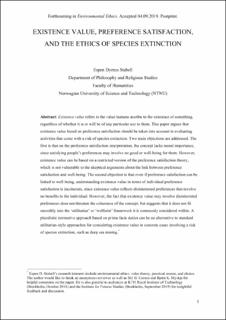| dc.contributor.author | Stabell, Espen Dyrnes | |
| dc.date.accessioned | 2020-08-24T11:14:51Z | |
| dc.date.available | 2020-08-24T11:14:51Z | |
| dc.date.created | 2019-09-04T21:32:46Z | |
| dc.date.issued | 2019 | |
| dc.identifier.issn | 0163-4275 | |
| dc.identifier.uri | https://hdl.handle.net/11250/2673618 | |
| dc.description.abstract | Existence value refers to the value humans ascribe to the existence of something, regardless of whether it is or will be of any particular use to them. This existence value based on preference satisfaction should be taken into account in evaluating activities that come with a risk of species extinction. There are two main objections. The first is that on the preference satisfaction interpretation, the concept lacks moral importance because satisfying people’s preferences may involve no good or well-being for them. However, existence value can be based on a restricted version of the preference satisfaction theory, which is not vulnerable to the skeptical arguments about the link between preference satisfaction and well-being. The second objection is that even if preference satisfaction can be linked to well-being, understanding existence value in terms of individual preference satisfaction is incoherent, because existence value reflects disinterested preferences that involve no benefits to the individual. However, the fact that existence value may involve disinterested preferences does not threaten the coherence of the concept, but suggests that it does not fit smoothly into the “utilitarian” or “welfarist” framework it is commonly considered within. A pluralistic normative approach based on prima facie duties can be an alternative to standard utilitarian-style approaches for considering existence value in concrete cases involving a risk of species extinction, such as through deep sea mining. | en_US |
| dc.language.iso | eng | en_US |
| dc.publisher | Philosophy Documentation Center | en_US |
| dc.title | Existence Value, Preference Satisfaction, and the Ethics of Species Extinction | en_US |
| dc.type | Peer reviewed | en_US |
| dc.type | Journal article | en_US |
| dc.description.version | acceptedVersion | en_US |
| dc.source.journal | Environmental Ethics | en_US |
| dc.identifier.doi | 10.5840/enviroethics201941215 | |
| dc.identifier.cristin | 1721703 | |
| dc.description.localcode | © 2020. This is the authors' accepted and refereed manuscript to the article. | en_US |
| cristin.unitcode | 194,62,70,0 | |
| cristin.unitname | Institutt for filosofi og religionsvitenskap | |
| cristin.ispublished | false | |
| cristin.fulltext | postprint | |
| cristin.qualitycode | 2 | |
